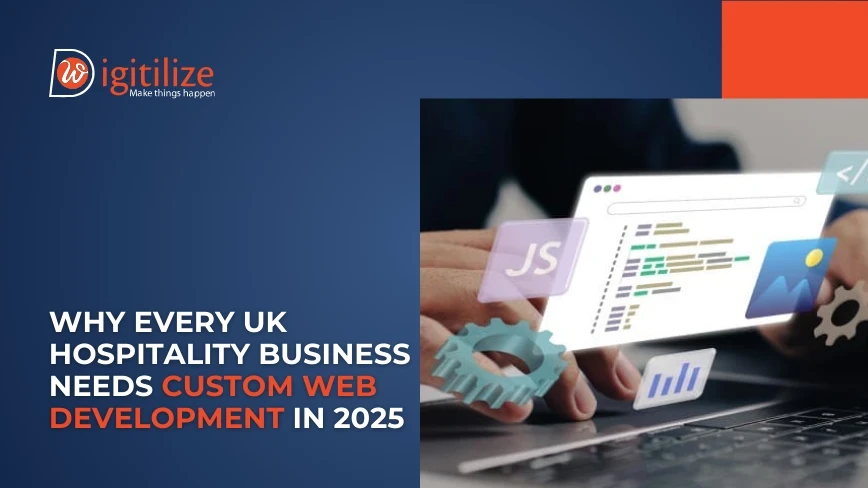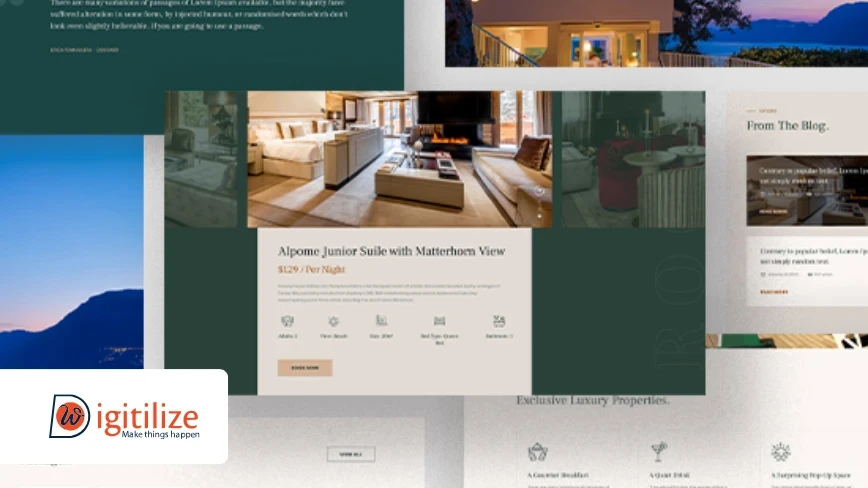Why Every UK Hospitality Business Needs Custom Web Development UK in 2025

The UK hospitality industry is evolving rapidly, and in 2025, having a strong online presence is no longer optional—it’s essential. Whether you run a hotel, a restaurant, or a tourism-related business, your website is your digital storefront. But here’s the thing: not all websites are created equal. A generic, one-size-fits-all site won’t cut it anymore. Custom web development UK is the way to go if you want to stay ahead of the competition.
Why? Because it gives you total control over your branding, user experience, and functionality. Plus, it helps you stand out in an industry where first impressions can make or break a booking. Let’s dive into why every UK hospitality business needs a custom web development UK in 2025.
Why Does a Hospitality Business Need a Website in 2025?
Many hospitality businesses wonder if having a website is necessary when they already use social media platforms like Instagram and Facebook. The simple answer is yes! While social media is useful for engagement, it does not provide full control over a business’s online presence. A well-designed website is essential for long-term success.Key Benefits of a Website for Hospitality Businesses
- Establishes Credibility and Professionalism
- Offers a Seamless Booking Experience
- Reduces Dependence on Third-Party Platforms
- Improves Search Engine Visibility (SEO Advantage)
- Enhances Brand Identity
- Provides a Fast and Mobile-Friendly Experience
- Keeps Customer Data Secure
What Are the Limitations of Generic Website Builders?
Platforms like Wix, Squarespace, and Shopify are popular because they are easy to use and affordable. However, they come with significant limitations, especially for hospitality businesses that need customised solutions. While they may work well for small startups, they often fail to meet the needs of growing businesses that require more flexibility and control.Key Limitations of Generic Website Builders

- Limited Customisation
- SEO Challenges
- Scalability Issues
- Limited Branding Opportunities
- Lack of Performance Optimisation
- Security Risks
- Limited Integration with Business Tools
14 Essential Features of a Custom web development UK in 2025

A well-designed hospitality website isn’t just a digital business card—it’s a powerful tool that drives bookings, enhances guest experiences, and boosts revenue. With the rapid advancements in technology, it’s crucial to equip your website with features that cater to modern travellers. Here are the must-have features for a custom hospitality website in 2025 and how they benefit both the business and its guests.
- Mobile-First Design
Benefits:
- Guests can easily browse and book from any device.
- Faster load times improve the user experience and SEO ranking.
- Reduces frustration and increases direct bookings.
- Integrated Direct Booking System
Benefits:
- Avoids hefty commissions from external platforms.
- Offers a seamless and secure booking experience for guests.
- Allows for personalized promotions and discounts for direct bookers.
- AI-Powered Chatbots & Virtual Assistants
Benefits:
- Reduces response time, improving customer satisfaction.
- Saves staff time by handling routine inquiries.
- Enhances engagement with personalized responses.
- Personalized User Experience
Benefits:
- Increases conversion rates by displaying relevant offers.
- Enhances user engagement with a more interactive experience.
- Encourages repeat bookings with personalized loyalty rewards.
- Multilingual and Multi-Currency Support
Benefits:
- Expands the customer base by catering to international visitors.
- Builds trust with a localized experience.
- Reduces confusion and improves booking completion rates.
- High-Quality Visuals & Virtual Tours
Benefits:
- Boosts engagement and helps customers make informed decisions.
- Reduces cancellations and refunds by setting clear expectations.
- Enhances trust with transparent, visually appealing content.
- Social Media & Influencer Integration
Benefits:
- Encourages bookings by showcasing user-generated content and reviews.
- Increases organic reach through influencer collaborations.
- Enhances engagement with live Instagram or TikTok feeds.
- Sustainable & Green Initiatives Section
Benefits:
- Attracts environmentally conscious guests.
- Enhances brand image and corporate responsibility.
- Encourages guests to participate in green initiatives.
- Advanced Security & Data Protection
Benefits:
- Protects guests from cyber threats and data breaches.
- Increases trust and credibility.
- Ensures compliance with global data protection regulations.
- Loyalty Program Integration
Benefits:
- Encourages repeat stays and long-term guest relationships.
- Provides valuable insights into customer preferences.
- Increases direct bookings by offering incentives.
- Smart Pricing & Dynamic Rate Adjustments
Benefits:
- Maximises revenue with competitive pricing on custom web development.
- Attracts budget-conscious travelers with strategic discounts.
- Reduces manual effort for hotel management.
- Seamless Third-Party Integrations
Benefits:
- Streamlines operations by automating workflows.
- Reduces errors in booking management.
- Enhances the guest experience with smoother transactions.
- Voice Search Optimization
Benefits:
- Increases visibility in search engine results.
- Simplifies the search process for mobile users.
- Enhances accessibility for all guests.
- Interactive Itinerary & Local Experience Guides
Benefits:
- Enhances guest experience by providing travel inspiration.
- Increases on-site engagement and time spent on the website.
- Encourages bookings for on-property experiences and partnerships.
Conclusion
In 2025, having a custom website isn’t just a luxury—it’s a necessity for UK hospitality businesses. From improved branding and SEO to seamless booking experiences and long-term cost savings, custom web development UK gives you a competitive edge.If you’re ready to take your hospitality business to the next level, investing in a tailor-made website is one of the smartest decisions you can make. Don’t settle for a generic online presence—build something that truly represents your brand and keeps customers coming back.
Want to explore your options? Get in touch with a web development expert DigitilizeWeb today and start transforming your business online!

